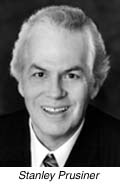
|
Neal
Nathanson Lectureship:
Dr. Prusiner's Background Stanley B. Prusiner, M.D., is Director of the Institute for Neurodegenerative Diseases and Professor of Neurology and Biochemistry at the University of California, San Francisco. He received his undergraduate and medical training at the University of Pennsylvania and his postgraduate clinical training at UCSF. From 1969-72, he served in the U.S. Public Health Service at the National Institutes of Health. Editor of 8 books and author of over 250 research articles, Prusiner's contributions to scientific research have been internationally recognized. He is a member of the National Academy of Sciences, the Institute of Medicine, the American Academy of Arts and Sciences, the American Philosophical Society, and is a foreign member of the Royal Society, London. He is the recipient of numerous prizes, including the Potamkin Prize for Alzheimer's Disease Research from the American Academy of Neurology (1991); the Richard Lounsbery Award for Extraordinary Scientific Research in Biology and Medicine from the National Academy of Sciences (1993); the Gairdner Foundation International Award (1993); the Albert Lasker Award for Basic Medical Research (1994); the Paul Ehrlich Prize from the Federal Republic of Germany (1995); the Wolf Prize in Medicine from the State of Israel (1996); the Keio International Award for Medical Science (1996); the Louisa Gross Horwitz Prize from Columbia University (1997); and the Nobel Prize in Physiology or Medicine (1997). Dr. Prusiner's Contributions Stanley Prusiner discovered an entirely new class of pathogens that replicate without nucleic acid. Through this work, he created a new field of research that has resulted in significant progress in understanding degenerative diseases of the central nervous system (CNS). His revolutionary studies have made conceptual advances in elucidating mechanisms of age-dependent CNS diseases. For several decades, the prevailing concept was that the transmissible CNS disease scrapie was caused by a slow-acting virus. Prusiner proposed what many scientists considered to be the heretical idea that the scrapie agent, which he called "prion," is composed only of protein and is devoid of nucleic acid. His incisive experiments demonstrated how an infectious pathogen lacking nucleic acid can multiply and cause CNS degeneration. After purifying prions from the brain, he discovered that they are composed of a single protein which he called "prion protein," or PrP. Prusiner found that a fragment of the protein polymerizes into amyloid; next, he and his colleagues demonstrated that amyloid plaques in the brains of animals and humans dying of prion diseases are composed of PrP. This was the first time that cerebral amyloid was shown to be the cause of a CNS disease. Prusiner and his colleagues discovered that disease causing scrapie PrP was derived from normal cellular PrP which is encoded by a chromosomal gene found in all animals examined. They determined that the tempo of scrapie in animals is controlled by the sequence of PrP and that the human diseases Gerstmann-Sträussler-Scheinker and familial Creutzfeldt-Jakob are caused by mutations in the PrP gene. This work identified the first mutations causing a CNS degenerative disease. Transgenic mice harboring PrP genes with a human disease mutation develop neurodegeneration spontaneously and transmit disease to inoculated recipients. These studies revealed how a disease can be both inherited and infectious, an unprecedented concept in the study of disease pathogenesis. Unable to find a chemical difference that distinguished cellular PrP from scrapie PrP, Prusiner and his colleagues demonstrated that the two PrP forms have different conformations, or shapes. Scrapie PrP is required initially for the change in shape to occur, thus, scrapie PrP functions as both a ligand and the product of the reaction. It also seems likely that a molecular chaperone mediates the conversion. Prion diseases appear to be the first recognized disorders of protein conformation. The extraordinary studies of Prusiner and his many very talented colleagues have significantly changed the way scientists and physicians think about CNS degenerative diseases. The unexpected results of their studies may have profound implications for future biomedical research in many areas of investigation. Almanac, Vol. 48, No. 21, February 5, 2002 |
ISSUE HIGHLIGHTS: Tuesday,
|
